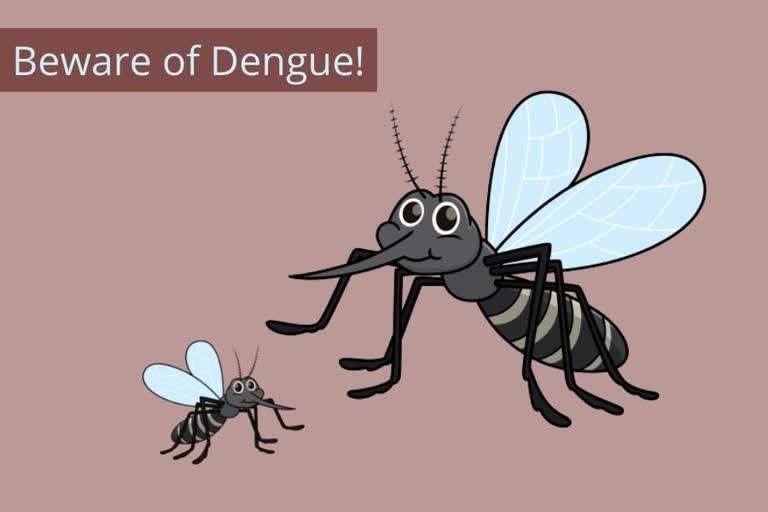Monsoon is here are so is the season of mosquito-borne diseases. One of the commonest diseases during this season is Dengue. According to the World Health Organization (WHO), about 500,000 people worldwide are hospitalized every year due to dengue. In India itself, the numbers have drastically increased in the past few years. According to the data released by the National Vector Borne Disease Control Program (NVBDCP), in the year 2019, more than 67,000 dengue cases were registered in India alone.
To know more about dengue, the ETV Bharat Sukhibhava team spoke to Dr. Rakesh Singh, Senior General Physician, Ghaziabad, who explains that dengue is a viral infection, which spreads through the bite of an infected female Aedes mosquito. Four viruses, called serotypes, DENV-1, DENV-2, DENV-3 and DENV-4 are mainly responsible for dengue and the virus spreads through the person's bloodstream throughout the body. The symptoms can vary from mild to severe and in severe cases, the infection can be fatal too. The symptoms may usually develop between 4-10 days after the bite.
Also read:Tips to avoid skin-related issues during monsoon
What are the symptoms?
Dr. Rakesh explains that along with high fever, dengue causes severe pain in the joints, muscles and bones. There are three types of dengue fever, he informs- Mild dengue fever, dengue hemorrhagic fever (DHF) and dengue shock syndrome (DSS).
Mild dengue may have symptoms that can be easily confused with other diseases. These, as mentioned by WHO, include:
- Fever
- Headache
- Pain behind the eyes
- Muscle and joint pain
- Nausea/vomiting
- Rashes
- Fatigue
On the other hand, talking about the severity of the disease, according to the Centers for Disease Control and Prevention (CDC), “warning signs of severe dengue usually begin 24–48 hours after your fever has gone away. Immediately go to a local clinic or emergency room if you or a family member has any of the following symptoms.
- Belly pain, tenderness
- Vomiting (at least 3 times in 24 hours)
- Bleeding from the nose or gums
- Vomiting blood, or blood in the stool
- Feeling tired, restless, or irritable"
Dr. Rakesh says that no symptoms of dengue should be taken lightly. Even the slightest delay in the treatment can worsen the condition and at times can be life-threatening. Although there is no proper cure available for dengue, the disease is treated with the help of medicines, oxygen therapy, blood or platelet transfusion, intravenous fluid, etc., depending upon the symptoms being presented.
Preventing dengue
In order to prevent dengue, it is necessary to protect oneself from mosquito bites. For this, mosquito repellents such as spray, coil, cream, machines or net can be used. Some other tips that can be followed are:
- Since dengue mosquitoes are more active during the morning and evening hours, avoid stepping out during such times. However, in case of unavoidable circumstances, wear clothes that completely cover your body. You can also use mosquito repellent creams and roll-ons that are easily available in the market.
- Fogging or spraying insecticides in and around the house can be helpful.
- If there are a lot of trees or lush long grass in/around the house, spray insecticides on them. Also if possible, get the grass trimmed.
- Do not let water collect in and around your house. Get the drains around the house cleaned and covered. All the vessels, as well as utensil in which water is stored, should be properly covered. Besides this, if you have a cooler, change its water regularly.
Apart from all this, Dr. Rakesh mentions that it is important for people to consume a healthy and nutritious diet, especially home-cooked meals. Keep your body hydrated and work on strengthening the immune system.
